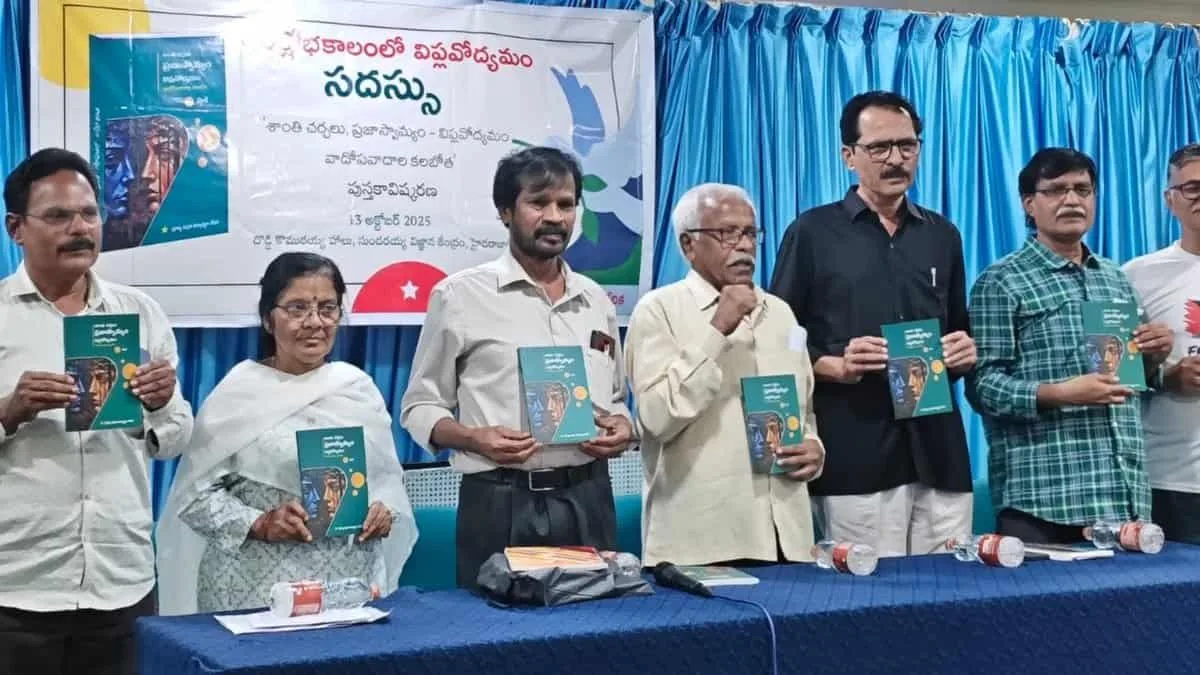Hyderabad: At a time when the Communist Party of India (Maoist) has been facing its toughest challenges ever in keeping the revolutionary movement alive, a section of the party’s central committee, defying the party and asking its cadres to surrender before the police, has created space for a debate in the mainstream society.
From the people’s debate on the need for peace talks between the Maoists and the state governments, which began in March this year, to the martyrdom of many of the party’s key leaders, and the surrender of several Maoists, including key leaders like Mallojula Venugopal, in the last seven months, a debate has also emerged among the intellectuals and activists.
On Monday evening, a book titled “Shanthi Charchalu, Prajaswamyam- Viplavodyamam- Vadopavadala Kalabotha” authored by Pani was released by ‘Poorva Viplava Vidyarthula Vedika’ at the Sundarayya Vignana Kendram in Baghlingampally.
Veekshanam editor N Venugopal spoke extensively about the book’s contents, the author’s accurate predictions even before the events unfolded, and the question of what could happen to the revolutionary armed struggle in the country.
N Venugopal seriously doubted the contents of the letter released in the name of the Maoist Party spokesperson Sonu last month declaring a ceasefire by the party, and strongly disputed the contents of another letter released by Mallojula Venugopal alias Abhay, who spent 57 years of his life building the movement.
Venugopal is the brother of top Maoist leader Mallojula Koteswara Rao alias Kishenji, who was killed in an alleged fake encounter on November 24, 2011, in West Bengal.
In his 22-page letter, Abhay (Mallojula Venugopal) criticised the central committee for not recruiting militia members, not expanding the movement to the urban landscape, and not making changes as per the prevailing international and domestic situations.
Veekshanam Venugopal said that nearly 700 Maoists killed in the last couple of years under the name of ‘Operation Kagaar’ was not new. In 1998, when N Chandrababu Naidu was the chief minister of the erstwhile Andhra Pradesh, 298 Maoists were killed in ‘encounters,’ which was the highest number of deaths in a single year at the time.
Talking about the necessity for peace talks between the Maoists and the state governments, N Venugopal cited the retired judge MN Rao, who had appointed two experts in economics to study the issue.
The case was concerning a few Maoist leaders like Sakhamuri Appa Rao, Modem Balakrishna (killed in September 2025) and others, who were booked under the Indian Terrorist and Disruptive Activities (Prevention) Act (TADA), which now stands repealed.
“While there were those who represented to the experts that the Maoists were the problem, there were many people who believed that Naxalism was the solution. The experts recommended that peace talks needed to happen between the then-ruling establishment and the Naxals,” N Venugopal said.
He also noted that the champions of the erstwhile AP’s civil rights movement, including top bureaucrat SR Sankaran, legendary advocates KG Kannabiran and Bojja Tarakam, and Telangana freedom fighter Keshav Rao Jadhav had formed ‘Poura Spandana Vedika’ at the time, to involve the civil society in dialogues and debates.
“In 2002, there was an attempt at a peace talk, but it couldn’t materialise. However, a committee was formed that would initiate the process. Vaartha Telugu newspaper received 2,000 letters from people, expressing their opinions about the envisaged peace talks. In October 2004, soon after coming to power, the Congress initiated talks with the Maoists,” N Venugopal said.
“The talks were held at the Manjeera Guest House, where both sides discussed issues like Adivasis and Dalit rights, Muslims, BCs, and women. The Congress government had declared a ceasefire for six months at the time,” N Venugopal said.
“The question in 2025 is whether this is a full stop, a coma, or a colon in the revolutionary movement,” he said.
He alleged that the slain central committee members Katha Ramachandra Reddy alias Vikalp and Kadari Satyanarayana Reddy alias Kosa, who were reportedly killed in an encounter on September 22, were captured before that, tortured and then killed.
Malathi, wife of Ramachandra Reddy narrated her ordeal of how the Narayanpur district administration deliberately let her husband’s body decay without being preserved well, despite the court orders, to make re-post mortem of the body impossible.
“There were burn marks on his chest, an eye missing and stab injuries on his ribs. We could only see the body partially,” she said, pointing out that she has approached both the High Court and the Supreme Court as well.
“Is this the path to struggle we need to take,” N Venugopal asked, also noting how revolutionary writer Varavara Rao, aged 85 and currently on bail living in Mumbai, was not granted permission by the court to go and get his root-canal procedure done in Hyderabad.
“The judge took just a few seconds to refuse the permission. Varavara Rao is a state government pensioner who can avail free medical treatment in Telangana. His pension is Rs 50,000 but expenditure in Mumbai is Rs 1 lakh. The root-canal procedure will cost Rs 5 lakh in Mumbai. The judge advises getting it done with the Rotary Club and Lions Club instead. This is how fair the judiciary is treating an 85 year old man,” he said.
He concluded, stating that the statements from a section of Maoist leaders urging the cadres to give up their arms and surrender were a conspiracy to keep people away from struggles, not leaving any scope for struggles.







